
The history of South Korea begins with the Japanese surrender on 2 September 1945. At that time, South Korea and North Korea were divided, despite being the same people and on the same peninsula. In 1950, the Korean War broke out. North Korea overran South Korea until US-led UN forces intervened. At the end of the war in 1953, the border between South and North remained largely similar. Tensions between the two sides continued. South Korea alternated between dictatorship and liberal democracy.It underwent substantial economic development.
The Liberty Korea Party (Korean: 자유한국당) was a conservative political party in South Korea that was described variously as right-wing, right-wing populist, or far-right. Until February 2017, it was known as the Saenuri Party, and before that as the Hannara Party from 1997 to 2012, both of which are still colloquially used to refer to the party. The party formerly held a plurality of seats in the 20th Assembly before its ruling status was transferred to the Democratic Party of Korea on 27 December 2016, following the creation of the splinter Bareun Party by former Saenuri members who distanced themselves from President Park Geun-hye in the 2016 South Korean political scandal.

The Democratic Party was a political party in South Korea. Formerly named Millennium Democratic Party, it was renamed on 6 May 2005. After its dissolution, its members joined the Uri Party or the successor Democratic Party.
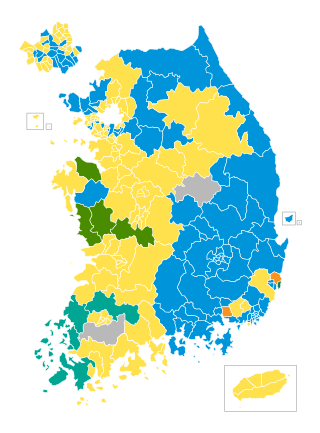
Legislative elections were held in South Korea on April 15, 2004. In the 17th election for the National Assembly, voters elected 299 members of the legislature. The newly formed Uri Party and other parties supporting President Roh Moo-hyun, who was impeached by the outgoing National Assembly, won a majority of seats. This was the first time a centre-left liberal party won a majority in the National Assembly.
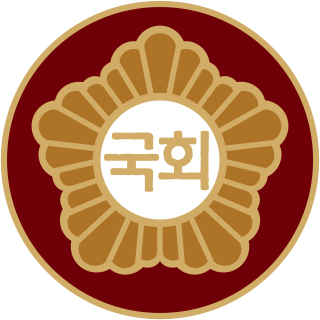
The National Assembly of the Republic of Korea, often shortened to the National Assembly, is the unicameral national legislature of South Korea. Elections to the National Assembly are held every four years. The latest legislative elections was held on 10 April 2024. The current National Assembly held its first meeting, and also began its current four year term, on 30 May 2024. The next Speaker was elected 5 June 2024. The National Assembly has 300 seats, with 253 constituency seats and 47 proportional representation seats; 30 of the PR seats are assigned an additional member system, while 17 PR seats use the parallel voting method.

Presidential elections were held in South Korea on 19 December 2002. The result was a victory for Roh Moo-Hyun of the ruling Millennium Democratic Party, who defeated Lee Hoi-chang of the Grand National Party by just over half a million votes.
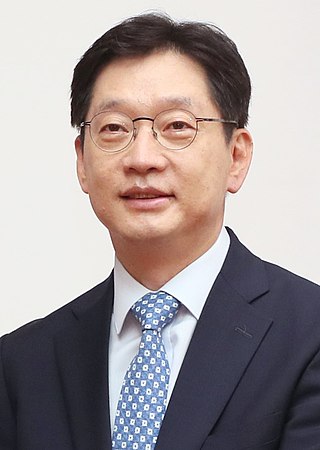
Kim Kyoung-soo is a South Korean politician who served as a member of the National Assembly of South Korea from 2016 to 2018, and as Governor of South Gyeongsang Province from 2018 to 2021, until he was convicted and arrested for opinion rigging.
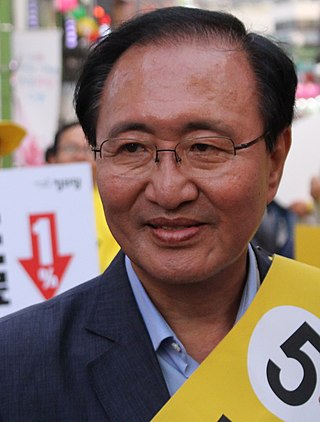
Roh Hoe-chan was a South Korean politician. He was a member of the 17th, 19th, and 20th National Assemblies. Roh was involved with multiple progressive-leaning parties, lately with the Justice Party from 2012 until his death in 2018.

Roh Moo-hyun was a South Korean politician and lawyer who served as the ninth president of South Korea between 2003 and 2008.

Legislative elections were held in South Korea on 11 April 2012. The election was won by the ruling Saenuri or New Frontier Party, which renewed its majority in the National Assembly, despite losing seats. The election was read as a bellwether for the presidential election to be held later in the year. The result confounded exit polls and media analysis, which had predicted a closer outcome.

Presidential elections were held in South Korea on 19 December 2012. They were the sixth presidential elections since democratization and the establishment of the Sixth Republic, and were held under a first-past-the-post system, in which there was a single round of voting and the candidate receiving the highest number of votes was elected. Under the South Korean constitution, a president is restricted to a single five-year term in office. The term of the then incumbent president Lee Myung-bak ended on 24 February 2013. According to the Korea Times, 30.7 million people voted with turnout at 75.8%. Park Geun-hye of the Saenuri party was elected the first female South Korean president with 51.6% of the vote opposed to 48.0% for her opponent Moon Jae-in. Park's share of the vote was the highest won by any candidate since the beginning of free and fair direct elections in 1987 and the first such election in which any candidate won a majority. Moreover, as of the 2022 election, this is the latest South Korean presidential election in which the winning candidate won an absolute majority of the vote.

Moon Jae-in is a South Korean politician who served as the 12th president of South Korea from 2017 to 2022. Prior to his presidency, he served as Senior Secretary for Civil Affairs and Chief of Staff to President Roh Moo-hyun, Member of the National Assembly, and Leader of the Democratic Party of Korea.
The Unified Progressive Party is a banned political party in South Korea. It was founded on 5 December 2011 as a merger of the Democratic Labor Party, the People's Participation Party of Rhyu Si-min, and a faction of the New Progressive Party. Until 12 May 2012 it was jointly chaired by Rhyu Si-min, Lee Jung-hee, and Sim Sang-jung.

Chun Doo-hwan was a South Korean politician, army general and military dictator who served as the fifth president of South Korea from 1980 to 1988.

Lee Wan-koo was a South Korean politician who briefly served as Prime Minister in 2015.

The 2018 South Korean by-elections was held in South Korea on 13 June 2018, coinciding with the local elections. 12 seats to the National Assembly of South Korea were contested.
Kang Gi-yun is a South Korean politician who is member of the National Assembly. He was a member of the South Gyeongsang Provincial Council from 2002 to 2007.

Yeo Yeong-gug is a South Korean politician who led the Justice Party from 2021 to 2022. He was previously a member of the National Assembly from 2019 until 2020, and also served on the South Gyeongsang Provincial Council.
Shim Wan-koo was a South Korean politician who served as the first elected Mayor of Ulsan. He was a member of the National Assembly from 1985 to 1992.
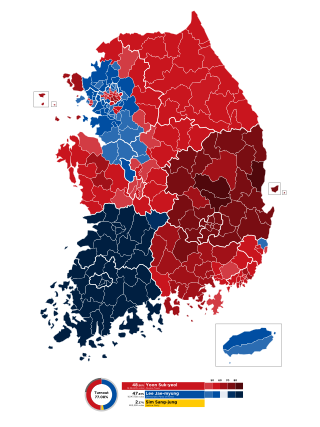
Presidential elections were held in South Korea on 9 March 2022. Under the South Korean constitution, presidents are restricted to a single five-year term, meaning that incumbent president Moon Jae-in was ineligible to run for a second term. Opposition candidate Yoon Suk Yeol of the People Power Party won the election, defeating candidate Lee Jae-myung of the incumbent Democratic Party.
















